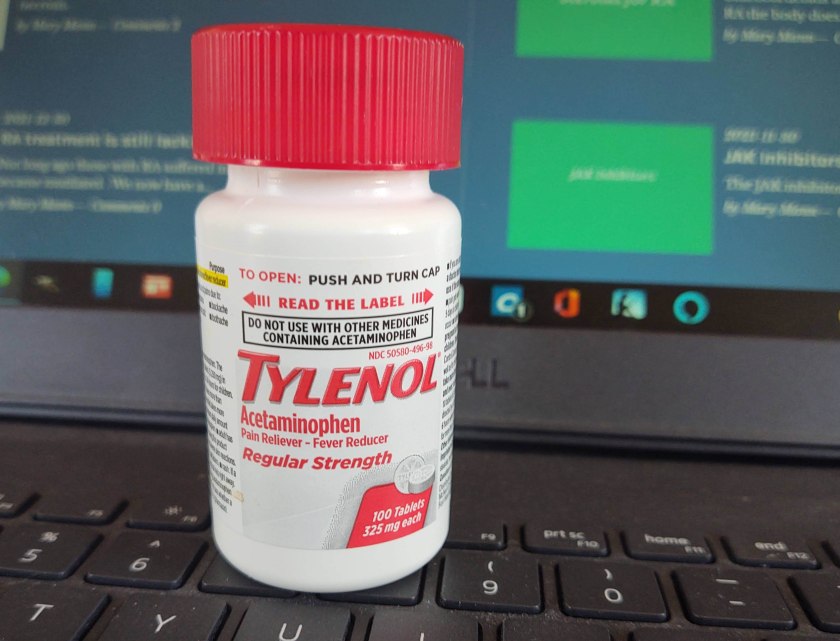Aspirin

As the best pain reliever in the world for the better part of a century, aspirin was the medication everyone turned to for headaches, fevers, joint pain and anything else that needed to be relieved. It was the only pill in town. My dad has his bottle of the white pills on his nightstand.
Aspirin was the first manmade concoction marketed to relieve arthritic pain. It was the Bayer company in Germany in 1899 who refined and stabilized the pain-relieving salicylate, acetylsalicylic acid, ASA, and then sold the powder to physicians. It was formed into a pill and marketed it as aspirin in 1915. Aspirin is a powerful drug that helps to bring down fevers, relieve arthritis pain, menstrual cramps, headaches plus many other maladies.
To good to be true? Maybe. Maybe not. Aspirin is a good pain reliever. However, to relieve the pain of RA a dose that is too large would be needed. And with large doses of aspirin there is a risk of GI bleeding which can be dangerous. There is also a risk of thinning blood so that bleeding becomes a problem. For children aspirin can cause Reyes Syndrome. And there are some who have allergies to salicylates.
Aspirin is a good medication in recommended doses over recommended times for adults who have no allergies to salicylates.
Acetaminophen (paracetamol)

Mixed with other drugs, acetaminophen had been around for a while. In 1955 Children’s Tylenol was launched. For the first time, acetaminophen was manufactured as the only active ingredient. It took six more years for regular strength Tylenol to be launched in 1961 for adults.
Aspirin now had competition. And now people had another choice. Acetaminophen became the next drug store pain reliever. Tylenol had arrived.
Of the four drugs, acetaminophen is the only one that is not a NSAID. It doesn’t have noticeable anti-inflammatory properties. Used excessively it can cause liver and kidney damage.
Here again in recommended doses for recommended times acetaminophen is a safe pain reliever for most adults.
Ibuprofen

The Boots Company developed Ibuprofen in 1969 in England. Initially, the NSAID, was a prescription drug in the US. It became available as an Over-the-Counter (OTC) drug in 1984.
So now we have three drug store pain relievers.
Aspirin now has lots of competition.
And
we have more choices when we go looking for
pain relief.
Ibuprofen is meant to be used short term. But like many other drugs, it is used excessively. Ibuprofen will cause stomach bleeding especially in those over sixty. Ibuprofen can also cause stroke or heart attack. The odds increase with the length of time and the amount of ibuprofen used.
Diclofenac, a NSAID, was first marketed in 1974 in Japan.
Meloxicam is a popular prescription NSAID as is Celebrex, a NSAID similar to Vioxx.
Vioxx, a COX2 inhibitor, was approved in 1999. However, shortly after its release, Merck, the manufacturer, was required to post two black box warnings on the label.
The first was that Vioxx could cause cardiovascular events. The second was that Vioxx could cause GI bleeding and perforation.
Merck took Vioxx off the market in 2004. It is estimated that Vioxx caused 27,000 heart attacks. Merck is trying to bring Vioxx back to the marketplace even though it paid billions of dollars out in lawsuits. Celebrex is also a COX 2 inhibitor but has not been taken off the market even though there have been many lawsuits for it settled against its manufacturer Pfizer.
Naproxen

Naproxen is a NSAID that relieves pain and inflammation but also increases risk of heart attack and stroke. It was a prescription drug 1976 becoming OTC in 1994. It is longer acting than ibuprofen and should be taken every 12 hours. It may cause GI issues and should be taken with food. Naproxen may affect the kidneys. It should be avoided during pregnancy as may harm the fetus.
Aspirin, Ibuprofen and naproxen are
Non-steroidal anti-inflammatory drugs
Or
NSAIDs
As well as pain relief, NSAIDs reduce inflammation in the body. A very good thing. But when used to excess there is a huge penalty to pay. Heart attacks, strokes, and GI bleeds. If you use NSAIDs regularly, it might be wise to use a proton pump inhibitor to protect your stomach. My rheumatologist prescribes pantoprazole for me.
We are lucky to have these choices available to us. We need to treat over the counter drugs as we do prescriptions. Following directions and using with caution.

